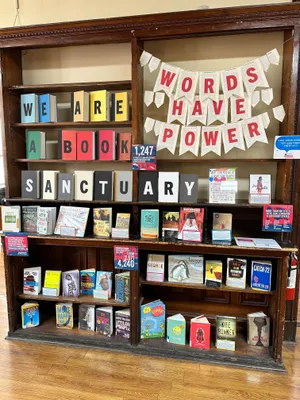People are supporting 'book sanctuaries' despite politics: 'No one wants to be censored'
Over 10,000 books were banned in public schools during the 2023-2024 academic year, according to a new PEN America report. American Library Association data shows that while the country saw a decrease in the first eight months of 2024, the number of bans and challenges still exceeds that of 2020, when the increase started.
Book banning, which the ALA defines as restricting access to material by removing temporarily or indefinitely, has been the subject of fiery debate in courts and classrooms, libraries and living rooms.
It’s prompted a wave of advocacy. “Banned Books Week” is one such initiative, and librarians in “book sanctuaries” are standing in solidarity with school libraries facing challenges and bans from politicians and parents alike.
Libraries establish ‘book sanctuaries’ to protect the right to read
While protesting – rallying, holding literacy events or even filing law suits – is central to much of the fight against book banning, some libraries are taking quieter, equally impactful steps.
Check out: USA TODAY's weekly Best-selling Booklist
In 2022, the Chicago Public Library declared itself a book sanctuary or “a physical or digital space that actively protects the freedom to read.” Book sanctuaries can exist in classrooms, libraries, coffee shops, bookstores and even personal collections. Among other things, they collect banned or challenged books and make them readily available to readers.
Chicago has a decades-long history of fighting book banning. It was the first public library in the country to issue an intellectual freedom statement in 1936, even before the ALA’s Library Bill of Rights. It even housed the ALA when it was first established, says Chris Brown, Chicago Public Library commissioner.
“As these book challenges were on the rise, we were really at a moment (of) reflecting on our history and our core values and realizing that we want to remind everyone what we stand for,” Brown says.
From there, the movement cascaded. Libraries around the country reached out to Chicago. Today there are over 4,000 book sanctuaries throughout the U.S.

Hoboken Public Library became the first book sanctuary in New Jersey in 2023 after they hosted a banned book readathon, which prompted social media attacks, mostly from outside the community. Taking a stand as a book sanctuary was a way to “uplift the majority statement,” says library director Jennie Pu. The community saw overwhelming support, she says. Later, the entire city declared itself as a Book Sanctuary City.
“This declaration to the world, saying, we don’t censor, we don’t ban books. In fact, we actively collect books and stories that are being banned,” says Pu.
The majority of Americans don’t support book banning. One ALA survey of almost 1,500 voters and public school parents found that 71% oppose removing books from public libraries, including a majority of Democrats, Republicans and independents. A 2023 NPR poll found similar numbers across party lines.
Book sanctuaries see broad community support
In Kentucky, Paris-Bourbon County Library declared itself a “First Amendment library” after one family challenged 102 books in a short period. Most of the titles related to the experiences of marginalized people. Removing them would have been “antithetical to everything that I believed in,” director Mark Adler told USA TODAY.
He waited until a board meeting to make his decision – if the community was OK with the removal, he would resign. If they opposed the challenges, he would “stay and fight for them.”
Those opposed to book removals outnumbered supporters by the hundreds.
“We had people across the political spectrum, we have people from both of the major parties on (the board) and they were highly supportive. They don’t feel anybody has the right to tell somebody else what to read, and certainly not to tell somebody else’s children what to read,” Adler says.
Recent legislation across the US allows removal and objection to school library titles containing sexual content, even if that content is not pornographic. Some have used that provision to challenge titles containing mention of sexual violence or an LGBTQ+ person or relationship.
According to the American Library Association, 47% of the 4,240 unique book titles targeted for censorship in 2023 were about or by LGBTQ+ individuals and people of color.
“Our collections have to be diverse and be a reflection of our society we live in, meaning you can’t just have one kind of viewpoint represented,” Pu says. “(Book sanctuaries) provide at least some baseline protection so a librarian can do our job and curate a thoughtful, diverse collection of all kinds of voices.”
Even in Texas, a state with the second-highest number of book bans, the Harris County Public Library system felt an outpouring of support when it declared itself and its branches a book sanctuary.
As the schools around them were removing titles from their shelves, director Edward Melton thought it was necessary to have a safe place for students to access information outside of the classroom. Though being a book sanctuary doesn’t provide any legal guardrails, it helps the staff feel comfortable doing their jobs without the threat of retaliation. It’s also a comfort to know the Commissioner’s Court, the local governing body, supports the right to read in Harris County, Melton says.
“We thought initially this would be treading into some shark-infested water – it really hasn’t been that experience,” he says.
Since adopting the resolution last year, Harris County has embraced the fight against book banning wholly. The county authorized a mural downtown protesting book bans. They’re also hosting concerts and book talks for Banned Books Week.
Chicago has seen similarly far-reaching support. A year after the public library declared itself a book sanctuary, Governor J.B. Pritzker signed a bill making Illinois the first state to outlaw book banning.

‘A fundamental right people really embrace’
Much of the book banning debate gets lost in semantics, Melton says. He approached the issue by going back to basics. When he uses the phrases “intellectual freedom” and “censorship,” he says people connect the dots about what’s really happening.
Similarly, that’s why Adler and the Paris-Bourbon County Library opted for the phrase “First Amendment Library.”
“I don’t care what your background is, what you’re interested in reading,” Adler says. “If you’re interested or have some drive to learn about something, my responsibility as a librarian is to help you find your material.”
Before becoming a book sanctuary, Melton recommends librarians first have a thoughtful conversation with local government officials to cut above the other politically charged language they may have heard.
“In America, no one wants to be censored. Everyone wants to be able to have intellectual freedom in terms of choosing what they read or choosing what information they consume,” Melton says. “It’s a fundamental right people really embrace. So if you start talking about taking away someone’s intellectual freedom, that’s when the community really gets up in arms.”
And though the libraries are on the front lines, Brown says anyone can get involved. For influencers, it could be making a video about banned books. For cafes and bookstores, it could be displaying frequently challenged titles.
“The more we have voices pointing out the importance of this that aren’t necessarily working in the field, the more it sends a message that this is an important issue and this is something that affects people,” Brown says.
Contributing: Anna Kaufman
Disclaimer: The copyright of this article belongs to the original author. Reposting this article is solely for the purpose of information dissemination and does not constitute any investment advice. If there is any infringement, please contact us immediately. We will make corrections or deletions as necessary. Thank you.







